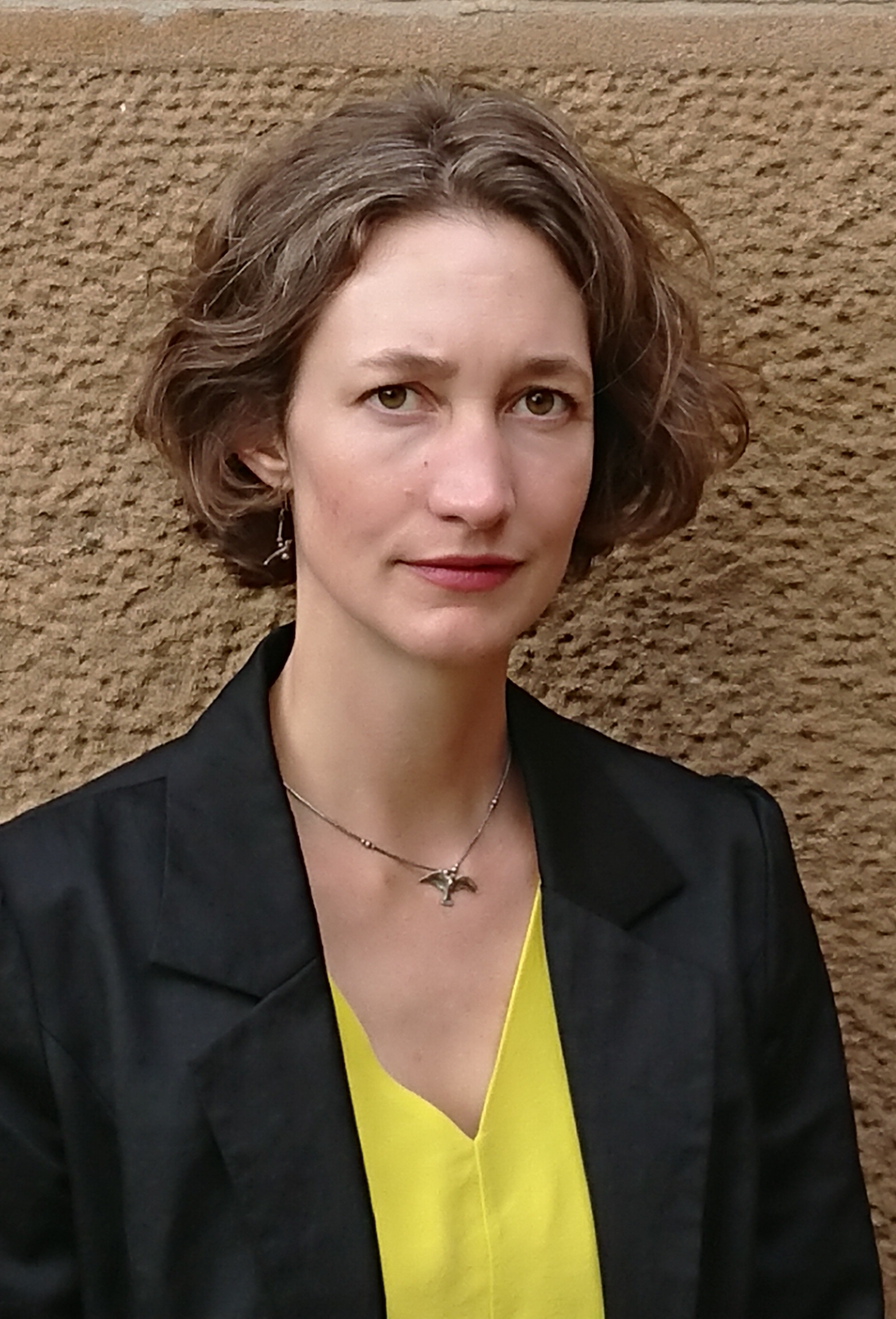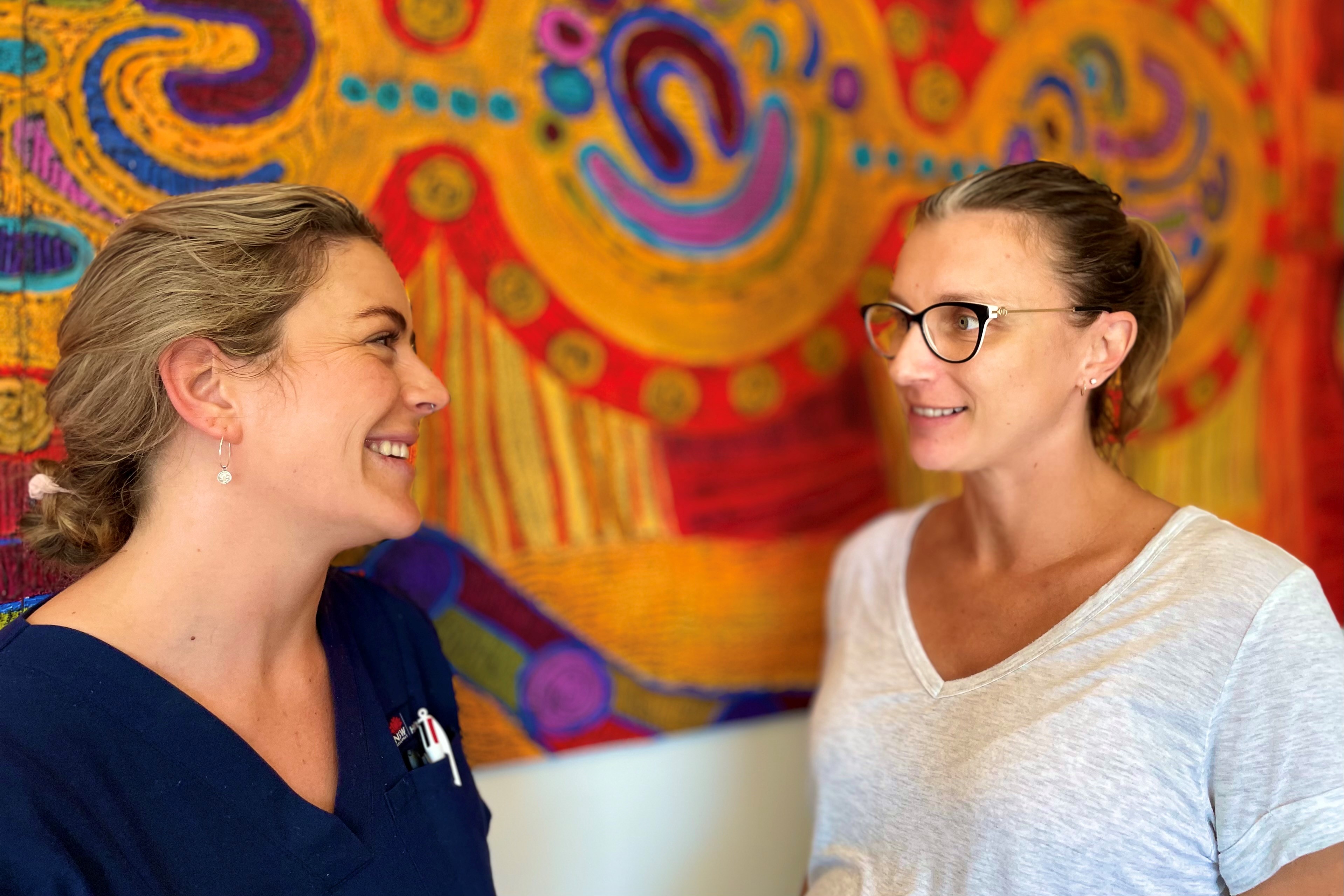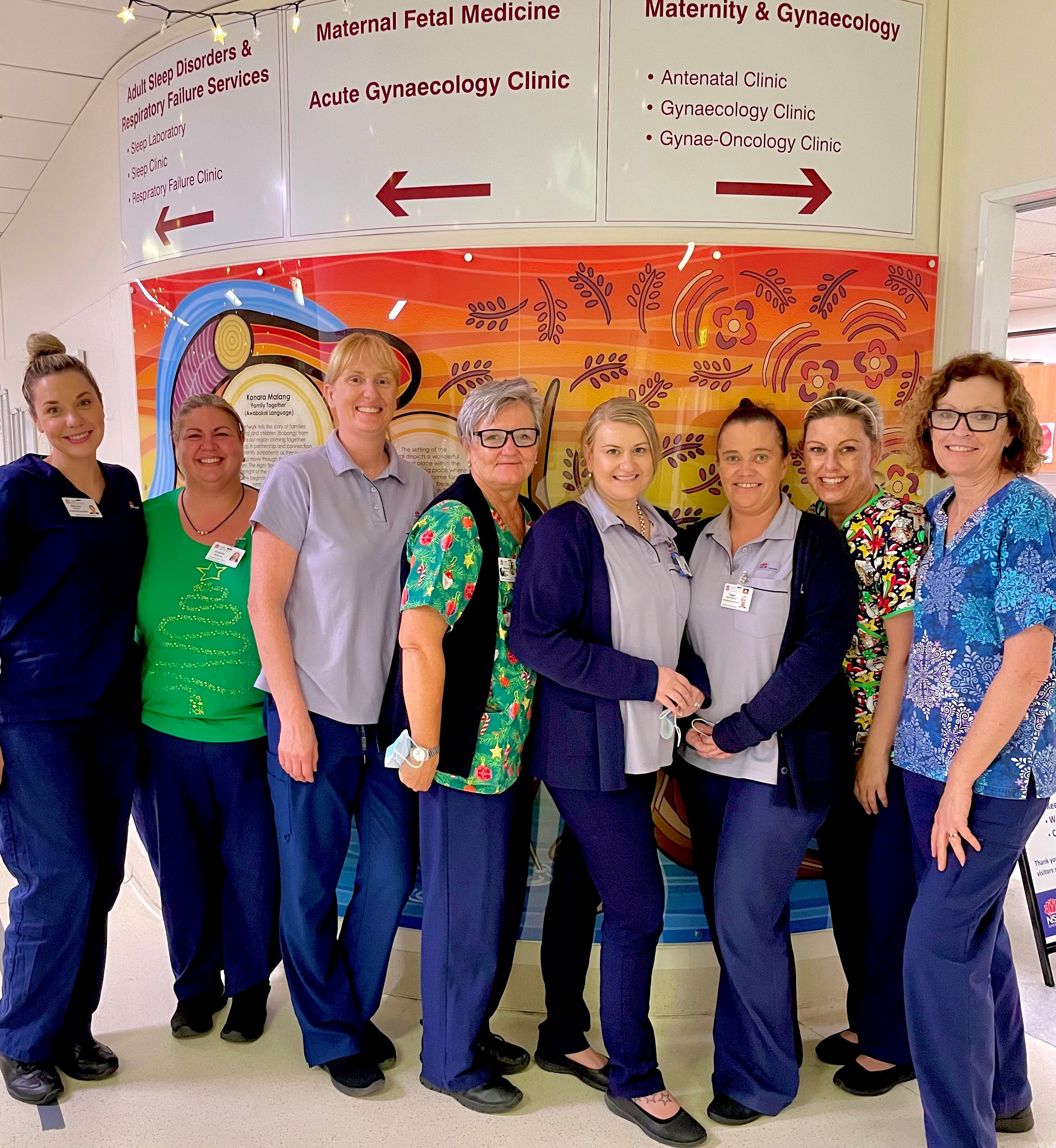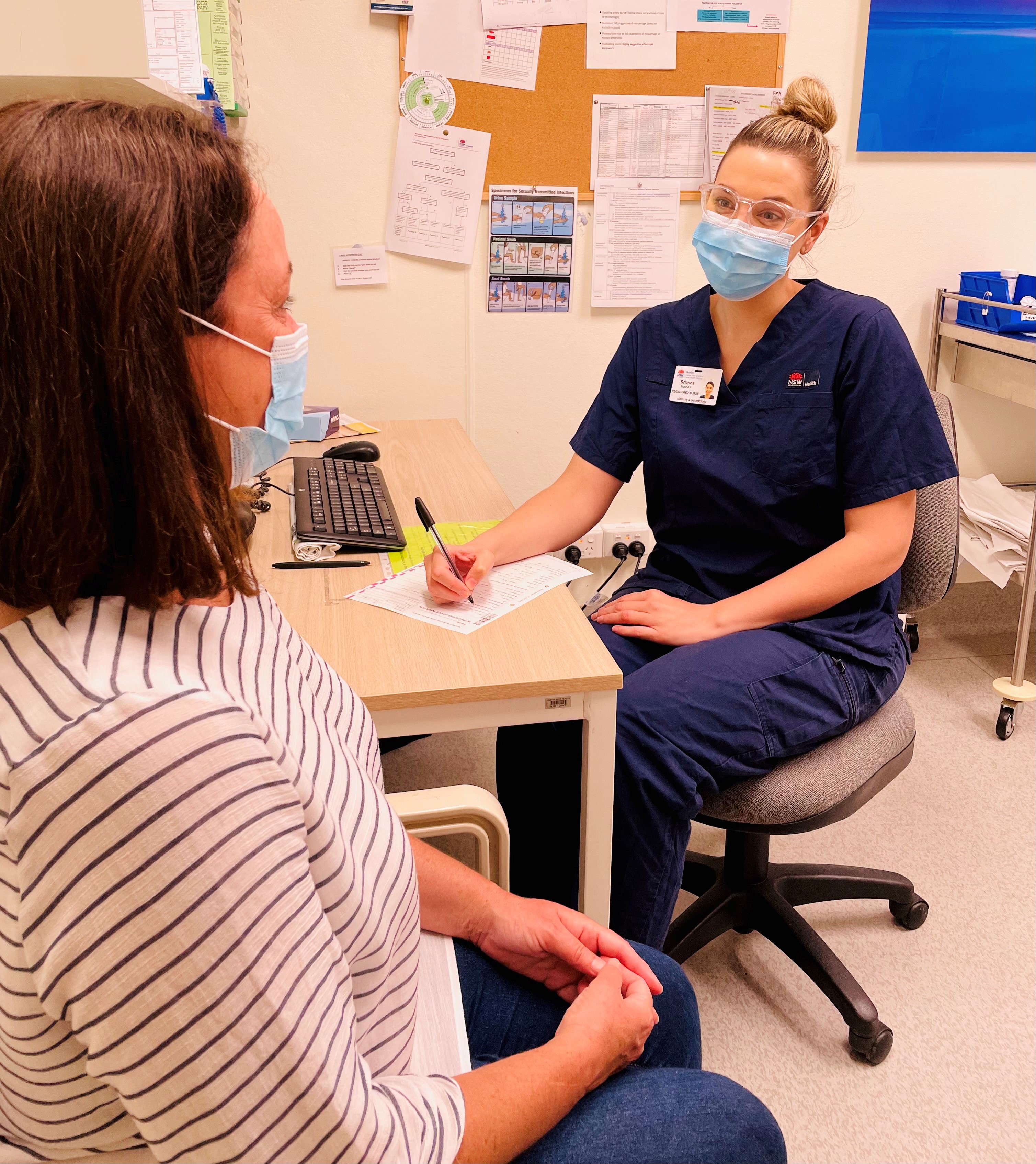
Gynaecology
Welcome to the John Hunter Hospital Gynaecology Service.
Our service provides care for a wide range of conditions that affect people across their entire lifespan, to include
- early pregnancy concerns
- abnormal bleeding and period problems
- pelvic and sexual pain
- ovarian cysts and masses
- structural differences in the vulva, vagina, and uterus
- urinary incontinence
- pelvic organ prolapse
- fertility problems
- vulvovaginal skin conditions
- abnormal cervical screening test (Pap) results
- contraception and termination of pregnancy
Our service is committed to Closing the Gap. We strive to identify, acknowledge, and individually welcome Aboriginal and Torres Strait Islander people who seek care in our clinics.
We acknowledge and embrace the diversity of gender and sexual expression. We recognise it can be difficult for transmen and non-binary people to seek care for Gynaecologic problems and aim to provide a safe space for everyone.
We welcome people from all cultural backgrounds and language groups and are committed to providing culturally appropriate and sensitive care.
The John Hunter Hospital Gynaecology service strives to provide collaborative, compassionate, and holistic care. Our health professionals aim to provide you with the knowledge you need to make informed decisions about your health and wellbeing.
Yours sincerely,
Dr Tania Day
John Hunter Hospital

Ward K3
Location
The John Hunter Hospital Gynaecology services are located in Ward K3 on the 3rd level to the western end of the hospital. K3 is a 12 bed unit providing health care to women for General Gynaecology and Gynaecological Cancers.
Our unit is shared with other services including 12 beds for high risk pregnant women and at times 8 extra beds are used to care for other women requiring a stay in hospital.
Layout – 4 bedded rooms/some single rooms
K3 consists of 12 beds which include 4 single rooms and 2 four bedded bays. Single rooms, where available, are given to patients with the greatest clinical need. If a room isn’t needed for this reason, it may be offered to a patient with private health insurance.
Caring for you
Each of these services are supported by doctors, nurses and allied health professionals such as social workers, physiotherapists, dieticians and occupational therapists. These teams provide specialised care and support for women with gynaecological issues. The Gynae-Oncology service is known as the Hunter New England Centre for Gynaecological Cancer. It is one of six such units in the state of NSW, and receives referrals throughout the state.
Clinical Handover
At John Hunter Hospital we aim to provide excellent healthcare for every woman, every time. An important part of this commitment is staff performing a clinical handover at the bedside every shift.
At handover, the nurse who has been caring for you provides information about your care and reason for your stay in hospital to the nurse who will be looking after you during the next shift.
The staff will involve you in this process, which will allow you to be included in the planning of your care and ensure that the information discussed is correct. You will also have the chance to ask any questions about your care.
REACH
REACH: Recognise, Engage, Act, Call, Help
If you or a family member become worried about your condition while in hospital:
- Have you spoken to your nurse or doctor?
- Have your concerns been answered?
- Are you still concerned?
If so, ask your nurse for a ‘Clinical Review’, or you can dial 0423 848 420 to call an emergency response.
A REACH poster will be displayed beside your bed with this information.
For more information click here
What to Bring to Hospital
Please bring all you need for yourself in 1 small overnight bag as space is limited in the hospital.
- A printed list of all medicines that are currently ordered by your GP. This is very important as your original referral may have medicines listed that have changed or you no longer take.
- A comfortable cotton nightshirt, long T-Shirt or sarongs are a good idea. Pants can sometimes be hard to wear as you may have a urinary catheter or other devices in place after your surgery. Night gowns are also helpful to prevent pain if your surgery has involved a large cut to your stomach. A dressing gown is also a good idea during the colder months
- Comfortable underwear that does not have tight elastic around the stomach and can support the use of wearing sanitary pads
- Sanitary sticky pads
- Comfortable clothes
- Non-slip shoes and slippers. This is very important when walking to the bathroom and wet areas
- Toiletries
- Mobile phone and phone charger
- Note pad/book/activity booklet to keep you busy during your stay
- Please leave all valuables such as jewellery and large amounts of money at home as there is no lockable storage for safe keeping.
General Information
Care Boards
You will notice a care board next to each bed when admitted to K3.The nurse will write you plan of care on the board each shift. This will keep all healthcare workers involved in your care up to date.
For your safety, we want to work together to plan your care and know what is important to you. You or your family/carer can write comments and questions on it at any time. If you have any questions regarding your care board, please ask one of our staff members.
Please inform us when you leave the ward. It is important that we check if there is anything we should do for you before you go, and confirm what time you plan to return.
Hand Hygiene
To help stop germs from spreading we ask that all visitors and patients, gel their hands as follows:
- Gel hands on entering unit
- Gel hands on entering patient’s rooms
- Gel hands on exit from patient’s room
- Inform staff if you are unwell
Providing a Safe Environment for Clients and Staff
Creating a safe environment for patients, visitors to our hospital and our staff is our priority. Any behaviour which puts women and their relatives/carers at risk will not be tolerated. Any behaviour which stops our staff from caring for women and providing a duty of care will also not be tolerated.
Should any person display such behaviour they may be asked to leave.
Security
The hospital has a lock down period between 9pm and 5.30am. During these hours, entrance and exit to John Hunter Hospital is through the main entrance only.
Security cameras are located in most areas throughout John Hunter Hospital.
Belongings and Valuables
To minimise the chance of misplacing your belongings it is helpful if you mark your items with a label that has your name on it. This includes glasses, hearing aids and phone chargers.
Staff will arrange for your valuables to be locked up if required. Lost property is located at the security office near the main entrance on Level 2. Please ask someone to bring in your personal belongings including toiletries, pyjamas, slippers and dressing gown as soon as possible. We keep a small supply of basic toiletries if necessary.
We do our best to ensure you receive your items if misplaced but we can not take responsibility for lost items. Valuable items are best left at home for safekeeping. There is no secure environment on the wards to store valuable items.
Car Parking
Car parking is available at John Hunter Hospital for a set fee. Limited free parking is also available on Lookout Road during certain hours.
Visiting Hours
John Hunter Hospital has an open visiting policy. We encourage a rest period on the ward between 1pm to 3pm but this is not strictly enforced. Most of our rooms consists of four-beds. When visiting we ask that you are mindful of this quiet period for your family member and other women on the ward.
We also request that you do not visit the hospital if you are feeling unwell for the safety of your loved one and others.
Your safety is important to us. If you decide to go for a walk or leave the ward please let the nurse looking after you or the team leader before leaving. It is helpful if you leave your mobile number on your care board for us to contact you if needed.
Meal Times
Meal times are approximately
- Breakfast 7.30 to 8.30 am
- Lunch 12 to 12.30 pm.
- Dinner 5.30 pm to 6 pm.
A small kitchen is located on each ward with tea, coffee making facilities, ice machine, fridge, toaster and microwave. These items are available for you to use.
Please make sure you follow these rules to avoid getting sick from food:
- Wash hands before and after touching food
- Keep food in a sealed container
- Label all food that you have put in the fridge
- Keep hot food hot and cold food cold
- Wash fresh fruit and vegetables before eating them
For the safety of yourself, visitors and our staff, we ask that all curtains in the ward areas are open at all times when appropriate, especially mealtimes to allow the meal trays to be delivered and collected safely.
Smoke Free Health Service
John Hunter Hospital is a smoke-free health service. Smoking is not permitted in the hospital or on hospital grounds. The nurse caring for you will assist you with smoking cessation support if required.
Televisions
Televisions are available for your use at each ward bed at no cost. The television service includes all major television channels.
Other Services Available
Chaplaincy, Pastoral Care Hospital Chaplains and Pastoral Carers are available to all patients and visitors. Please ask one of our friendly staff to contact the service if required. The JHH Chapel is located near the main entrance and is open at all times. Chapel services are held on a regular basis, the times of which are advertised in the chapel and on the Pastoral Care brochure.
Pharmacy
The hospital pharmacy is located near the main entrance on Level 2, outside the Outpatients Clinic, and is available to all admitted patients to fill their scripts before going home.
Doc’s Pharmacy is a commercially run pharmacy which will fill scripts that aren’t able to be given by the hospital pharmacy. It is located in the food court on Level 2.
Hair Dresser
MK Hair is located on level 2 near the food court area and is available to all patients for hair washing and cutting services.
Newsagency
JHH News and Gifts Newsagency is located on Level 2 to the right of the hospital’s main entrance. Cards, gifts, sweets, phone cards and lottery services are available.
Places to eat
There are a number of places to eat at the John Hunter Hospital Campus.
Kookaburra Cafeteria is located on level 1, between Wards H1 and J1. This cafeteria offers a range of hot food, sandwiches, drinks and sweets.
Grab and GoGo Café is located on Level 2, inside near the main entrance. Sandwiches, drinks (hot and cold), sweets and hot meals are available.
Baratza Coffee Shop is located at the Eastern end Level 2 (Royal Newcastle Centre). Drinks (hot and cold) and sweets are available.
Little Baratza Coffee Shop is located at the Western end of the hospital Level 2 (next to K Block). Hot and cold drinks and sweets are available 8am-2:30pm Monday to Friday only.
Central Food Court is located at the Eastern end of Level 2 (Royal Newcastle Centre), with many hot food and beverage options available.
“Wrap it Up” is located at the eastern end of the hospital on level 2 (Royal Newcastle Centre). It provides fresh and healthy sandwiches, wraps and nourish bowls 9am-3pm Monday to Friday.
Financial Services
An ATM is located at the main entrance of the hospital on Level 2 opposite the Information Desk.
Gift Shop
KC’s Gift Shoppe is located near the main entrance on Level 2. It is run by John Hunter Hospital Site Carers (hospital volunteers) and has gifts, toiletries and sweets available.
Accommodation for Families
JHH has limited accommodation available for relatives travelling long distances (greater than 100km). These units provide a pleasant space and close by accommodation for relatives of patients who need treatment and care at JHH. Please ask our friendly staff who can assist with your enquiry.
Gynaecology Support Services
Early Pregnancy Assessment Service | A clinic at John Hunter Hospital that supports women with pain, bleeding or other complications in early pregnancy up to 18 weeks. Located on Level 2 – Maternity & Gynaecology Services Outpatient Department. Appointments are by referral only through a GP or Emergency department. |
| Multicultural health services | Helps women and families from different cultural backgrounds with their care. The Healthcare Interpreter Service is available 24 hours a day, 7 days a week. This support is available to women admitted to hospital or seen in the clinic. |
| Aboriginal Liaison Officer | Helps indigenous patients and families while in hospital. This support is available to both women admitted to hospital or seen in the clinic |
| Drug & Alcohol Support Services | Supports women and their families that may have problems with drugs and alcohol. This support is available to both women admitted to hospital or seen in the clinic. |
| Social work | Supports women and their families. They can provide counselling for people experiencing grief and loss, or women struggling with personal problems at home or while in hospital. Our team of social workers also help with information about accommodation, transport, travel allowance (IPTAS) and provide support after going home from hospital. |
| Dietitian | Helps with dietary support and information before and after treatment. They are available to both people visiting the clinic or women staying in hospital. |
| Physiotherapy | A physiotherapist is available to see women before and after their surgery. They teach and assist women with breathing/leg exercises and walking. Our physiotherapists also teach women about prevention and management of lymphodema. |
| Occupational therapy | Helps people to be safe and independent at home. They are available to assess women and provide equipment if needed. |
| Psychologists | Supports and talks to you about how you are feeling while in hospital. This support is available to women admitted to hospital or in the clinic. |
| Cancer Care Coordinator | Supports women to understand what is happening with their treatment. The cancer care coordinator meets with the team each week to talk about results and plan treatment. |

General Gynaecology Clinics
General Gynaecology Clinics
John Hunter Hospital provides expert care to women across the Hunter New England Health  District for a range of Gynaecological issues.
District for a range of Gynaecological issues.
Gynaecological problems include
- period (menstrual) pain
- chronic pelvic pain
- heavy menstrual bleeding
- vulval conditions
- endometriosis
- fibroids
- after abnormal cervical screening (pap smears)
- infertility
- Onco-fertility and gender fertility
- recurrent miscarriage
- incontinence
- issues associated with prolapse.
- Long acting contraception such as Mirena IUD, Copper IUD, Implanon and Zoladex Implant
John Hunter Hospital also provides a specialised service to support girls and young people with a range of gynaecological problems. This is called the Paediatric and Adolescent Gynaecology (PAG) service.
Referrals
You will require a referral from your GP outlining your gynaecological concerns. Once your GP sends the referral, it may take up to 10 days for processing. One of our Gynaecology Specialists will review your referral and decide how urgently you need to be seen.
You will be notified via text message once your referral has been received and processed. You will then be notified by letter of an appointment.
Early Pregnancy Assessment Service (EPAS).
The Early Pregnancy Assessment Service (EPAS) is an outpatient service dedicated in supporting women that experience:
- Pain/bleeding or other problems in early pregnancy before 18 weeks gestation
- A Nurse Led clinic also operates as part of the EPAS service, offering the insertion of long acting birth control devices such as intrauterine devices, pessary reviews and zoladex injections.
Women must be deemed medically safe to be reviewed in EPAS.
Referral
You may be referred to the EPAS by your GP or the Emergency Department if you have presented there for a review.
EPAS aims to contact all women within 72hrs and is an appointment only based service. EPAS does not accept walk-ins.
Colposcopy clinic
Your GP may refer you to the John Hunter Colposcopy Clinic for a closer examination of your cervix after a positive or abnormal Cervical Screening Test (CST) result. You may otherwise know this test as a Pap Smear.
It is important to remember that most abnormal CST results are NOT cancer, and your abnormal results may be caused by inflammation or an infection.
A colposcopy is a procedure that uses a special microscope (colposcope), like a pair of binoculars mounted that are attached to a stand and connected to a powerful light. It allows the doctor to find any cell changes and to assess the extent of the cell changes.
The procedure takes approximately 5 to 15 minutes. The examination can be uncomfortable but not painful. Sometimes a biopsy may be taken to send for further testing. If this occurs, you will be notified of this result in approximately 2 weeks’ time with advice if further treatment is required.
Referral
Your GP will need to send a referral
What to bring to your appointment
Your medicare card
Your healthcare card (if applicable)
An updated referral from your GP if there have been any changes in your condition

